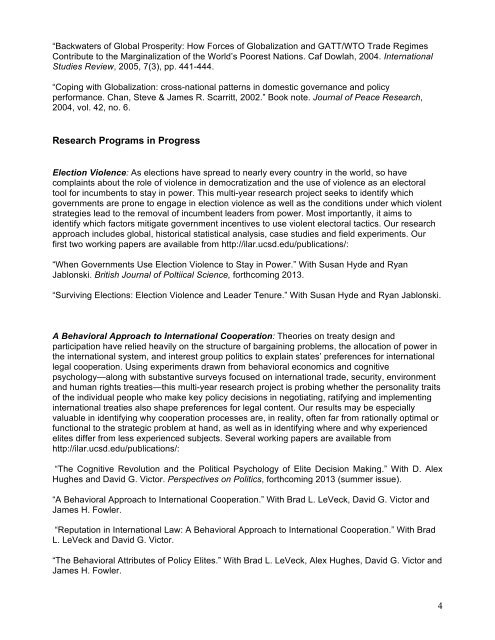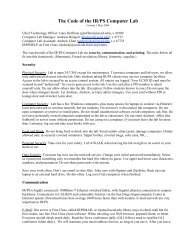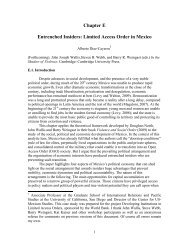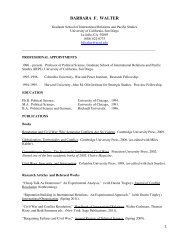Emilie Marie Hafner-Burton - School of International Relations and ...
Emilie Marie Hafner-Burton - School of International Relations and ...
Emilie Marie Hafner-Burton - School of International Relations and ...
You also want an ePaper? Increase the reach of your titles
YUMPU automatically turns print PDFs into web optimized ePapers that Google loves.
“Backwaters <strong>of</strong> Global Prosperity: How Forces <strong>of</strong> Globalization <strong>and</strong> GATT/WTO Trade Regimes<br />
Contribute to the Marginalization <strong>of</strong> the World’s Poorest Nations. Caf Dowlah, 2004. <strong>International</strong><br />
Studies Review, 2005, 7(3), pp. 441-444.<br />
“Coping with Globalization: cross-national patterns in domestic governance <strong>and</strong> policy<br />
performance. Chan, Steve & James R. Scarritt, 2002.” Book note. Journal <strong>of</strong> Peace Research,<br />
2004, vol. 42, no. 6.<br />
Research Programs in Progress<br />
Election Violence: As elections have spread to nearly every country in the world, so have<br />
complaints about the role <strong>of</strong> violence in democratization <strong>and</strong> the use <strong>of</strong> violence as an electoral<br />
tool for incumbents to stay in power. This multi-year research project seeks to identify which<br />
governments are prone to engage in election violence as well as the conditions under which violent<br />
strategies lead to the removal <strong>of</strong> incumbent leaders from power. Most importantly, it aims to<br />
identify which factors mitigate government incentives to use violent electoral tactics. Our research<br />
approach includes global, historical statistical analysis, case studies <strong>and</strong> field experiments. Our<br />
first two working papers are available from http://ilar.ucsd.edu/publications/:<br />
“When Governments Use Election Violence to Stay in Power.” With Susan Hyde <strong>and</strong> Ryan<br />
Jablonski. British Journal <strong>of</strong> Poltiical Science, forthcoming 2013.<br />
“Surviving Elections: Election Violence <strong>and</strong> Leader Tenure.” With Susan Hyde <strong>and</strong> Ryan Jablonski.<br />
A Behavioral Approach to <strong>International</strong> Cooperation: Theories on treaty design <strong>and</strong><br />
participation have relied heavily on the structure <strong>of</strong> bargaining problems, the allocation <strong>of</strong> power in<br />
the international system, <strong>and</strong> interest group politics to explain states’ preferences for international<br />
legal cooperation. Using experiments drawn from behavioral economics <strong>and</strong> cognitive<br />
psychology—along with substantive surveys focused on international trade, security, environment<br />
<strong>and</strong> human rights treaties—this multi-year research project is probing whether the personality traits<br />
<strong>of</strong> the individual people who make key policy decisions in negotiating, ratifying <strong>and</strong> implementing<br />
international treaties also shape preferences for legal content. Our results may be especially<br />
valuable in identifying why cooperation processes are, in reality, <strong>of</strong>ten far from rationally optimal or<br />
functional to the strategic problem at h<strong>and</strong>, as well as in identifying where <strong>and</strong> why experienced<br />
elites differ from less experienced subjects. Several working papers are available from<br />
http://ilar.ucsd.edu/publications/:<br />
“The Cognitive Revolution <strong>and</strong> the Political Psychology <strong>of</strong> Elite Decision Making.” With D. Alex<br />
Hughes <strong>and</strong> David G. Victor. Perspectives on Politics, forthcoming 2013 (summer issue).<br />
“A Behavioral Approach to <strong>International</strong> Cooperation.” With Brad L. LeVeck, David G. Victor <strong>and</strong><br />
James H. Fowler.<br />
“Reputation in <strong>International</strong> Law: A Behavioral Approach to <strong>International</strong> Cooperation.” With Brad<br />
L. LeVeck <strong>and</strong> David G. Victor.<br />
“The Behavioral Attributes <strong>of</strong> Policy Elites.” With Brad L. LeVeck, Alex Hughes, David G. Victor <strong>and</strong><br />
James H. Fowler.<br />
4






